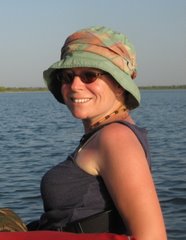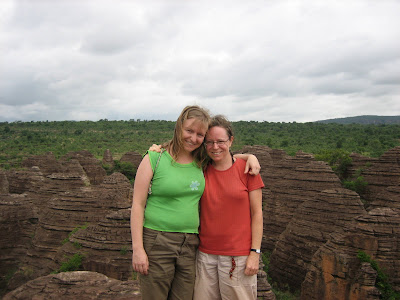Out of the initial four MDs that were there, only one remains - she's really dedicated to West Africa and really perserveres despite everything.
Here is an article from the Houstone Chronicle about Suzanne's ongoing work - the patient mentioned was diagnosed and started on treatment about a month before I left Burkina.
http://www.chron.com/disp/story.mpl/headline/world/5986438.html
Reading it makes me quite homesick for Bobo Dioulasso - the work was often so frustrating and discouraging, and yet there are moments of triumph, and that is the work I feel so passionate about.
The stakes are so high. It makes it hard for me to relate when people here complain about not having weekend access to fancy tests (as happened this weekend on call), and about the "lack of resources" in one of the worlds richest - and best funded - public health care systems. Our system can always improve, and there is needs for more and more. Despite being in a city where there is a lot of relative poverty, we are really lucky. If someone comes here in from the street they can get the same care as everyone else because its not based on what you can pay.
In the year since I've been back, I haven't seen one child who was severely malnourished. Not one who died because basic health care services weren't available, or because they couldn't afford $4 worth of antibiotics and supplies.
We can always work for better, but we really are the most fortunate of countries. And we need to protect that at all cost.












 In the mouth of the Nile there were lots of men in fishing boats like the one shown here...
In the mouth of the Nile there were lots of men in fishing boats like the one shown here...








 Even in prison, there were huge differences between how the apartheid-defined racial groups were treated. I just have so much trouble understanding how an entire country was run on those bases for 50 years - true democracy only started in 1994 in South Africa!
Even in prison, there were huge differences between how the apartheid-defined racial groups were treated. I just have so much trouble understanding how an entire country was run on those bases for 50 years - true democracy only started in 1994 in South Africa!












 When it started pouring rain right at the appointed hour for the party, I was worried that no one would come – rain stops nearly everything in Burkina. In fact, Claire and I had been just about to leave home when the rain started, and as we were all dressed up in our finery we didn’t want to brave the rain and mud of driving there by moto… so had it not been for Bertrand who kindly came and fetched us, we’d have been much later than we were. But our friends braved the rain and the turn out was really good – the 4 counsellors, the 3 Kesho Bora doctors, 2 of the pediatricians, the pharmacist – and of course, Bertrand, Siddiqui and his kids and Amadou. They gave me 3 very nice gifts, and Dr Tamboura – the neonatal ward pediatrician – made a nice little speech.
When it started pouring rain right at the appointed hour for the party, I was worried that no one would come – rain stops nearly everything in Burkina. In fact, Claire and I had been just about to leave home when the rain started, and as we were all dressed up in our finery we didn’t want to brave the rain and mud of driving there by moto… so had it not been for Bertrand who kindly came and fetched us, we’d have been much later than we were. But our friends braved the rain and the turn out was really good – the 4 counsellors, the 3 Kesho Bora doctors, 2 of the pediatricians, the pharmacist – and of course, Bertrand, Siddiqui and his kids and Amadou. They gave me 3 very nice gifts, and Dr Tamboura – the neonatal ward pediatrician – made a nice little speech.





 People live as they have for generations, including brewing millet beer from red sprouted millet seeds in hand-made pots, boiled over a mud brick oven for 3 days before setting down to ferment.
People live as they have for generations, including brewing millet beer from red sprouted millet seeds in hand-made pots, boiled over a mud brick oven for 3 days before setting down to ferment.






